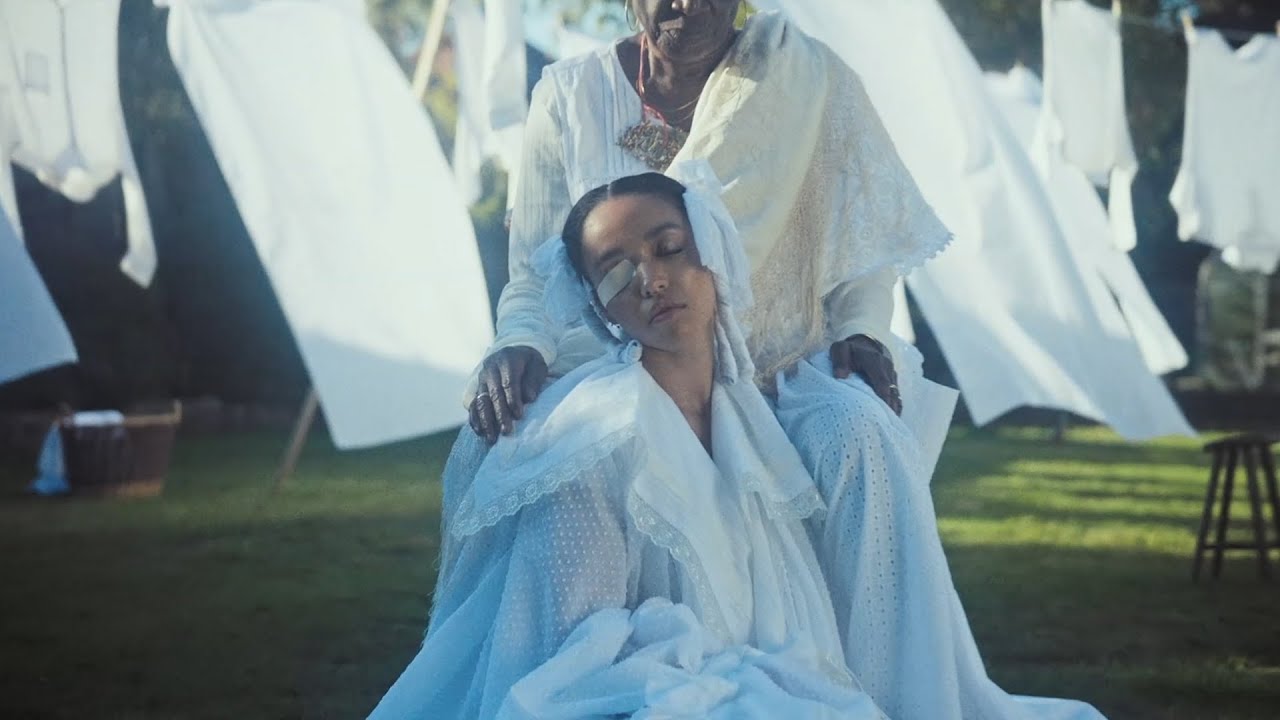On the cover of FKA twigs’ new full-length album MAGDALENE, the artist’s first release since the 2015 EP M33LL155X, is a bizarrely beautiful portrait of Twigs designed by artist Matthew Stone. It, and the album’s additional pamphlet images, use digital manipulation to depict twigs’ face and figure in humanoid form. Her skin is hardened and made granular, her eyes are an inhuman shade of blue.
Twigs’ shapeshifting visual presentation, awe-inspiring choreography and near obscenely well-curated art direction work in tandem yielding a flagrant and modern eroticism. But the sexuality of twigs’ music shares little in common with the lovestruck musings of Ariana Grande or Taylor Swift. What Stone’s MAGDALENE images emphasise about twigs is the artist’s embodiment of female sexuality as an enigma. A paradox. A polymorphous flow of energy and experience.
Twigs has always focused on desire as something that yields ecstasy and anxiety in equal measure. To paraphrase Eric Henderson writing about the artist for Slant , “desire and repulsion” are so indistinct that they are indistinguishable in the music of FKA twigs.
Undoubtedly, Sexuality has long been and remains a driving force in twigs’ provocative lyrics, hypnotic sound, and mesmerisingly beautiful dancing. That said, the artist’s sexual philosophy has grown more expansive over her career, with each album bringing in new dimensions into twigs’ libidinal energy. 2014’s LP1 captured sexuality as a contradictory and fluid sequence emphasising lust as a force imbuing in us confidence and self-doubt in equal measure. 2015’s M3LL155X went further: as observed by Adam Kivel in Consequence of Sound, the album’s employment of subtly fragmented R&B productions weaved in an element of the uncanny valley into twigs’ work. In her slight refusal to adhere to “normative” pop elements while still vaguely alluding to those elements, twigs represented sexuality as a flow illustrating our inherent alterities.
The most notable progression of MAGDALENE is that the omnipresent sexuality of twigs’ music has been personalised: this album is about FKA twigs, her sexuality, and her experiences as a woman and a sexual being. Whereas previous records provocatively alluded to a universal erotic charge driving twigs’ sound and aesthetic, MAGDALENE looks at the various life forces that collide with sexuality and yield poetry from it.
More than on any previous release, twigs does this by opening herself and her life up to her listeners. The Daniel Lopatin co-written track ‘Day Bed’, for instance, chronicles twigs masturbating in response to a depression caused by some romantic failure; sex yields joy and ecstasy, joy and ecstasy yield despair, and despair can be alleviated by sex.
This focus on the personal and the expressive has FKA twigs reflecting on the essentially contradictory roles she inhabits as a woman, a performer, and a human: public and private, sexual being and maternal/caring figure, and artist and celebrity. On the album’s central track, ‘Mary Magdalene,’ a spectral synth progression (produced by twigs and album co-producer Nicolas Jaar) suggestively whispers along before twigs sings, “A woman’s work, A woman’s prerogative, A woman’s time to embrace, she must put herself first.”
The track of course celebrates the Biblical figure and follower of Christ Mary Magdalene, who is often portrayed as a repentant prostitute by Christian religious leaders despite vast evidence suggesting that she was no such thing. What twigs seems to be grappling with here is the idea that somehow Magdalene couldn’t be both a sexual being and a loyal, comforting presence to Christ at the same time. She finds in Magdalene an unfair stereotype about women’s sexuality. With her incredible soprano hushed and sequenced under a showy chorus, she sings, “I do it like Mary Magdalene, I want you to say it, Come just a little bit closer till we collide.”
On album opener ‘Thousand Eyes,’ twigs’ voice takes on a choral effect as she weaves it into a sparse rhythmic pattern, “If I walk out the door it’s not our last goodbye,” she sings. Twigs is in a unique position within culture. She has the mystique of the enigmatic avant-pop chanteuse and is afforded all the critical fascination normally afforded to artists of that caliber. But she also has been in two high-profile public relationships with massive movie stars (Robert Pattinson and Shia LaBeouf respectively) that have garnered her a tabloid presence rarely bestowed upon experimental musicians in late modernity (more a curse than a blessing, I’m sure). On this track, twigs addresses these relationships. But she only gives us a peek into her life off stage, crafting a slippery barrier between her public persona and herself as the private individual Tahliah Barnett. The tension between what she shows us and refuses to show creates an eerie intensity. “It’s gonna be cold with all of those eyes,” she sings cryptically.
Twigs’ soprano vocals have always separated her from other singers. Her cadence is so fluid, airy and hypnotic that she is able to harmonise with beats and production that would be well outside the range of most pop stars. She has managed to create addictive melodies and hooks against the sometimes abstract and alien sounds of producers like Arca and Clams Casino. You can hear her uncanny vocal ability on tracks like ‘Home with You’. The song opens with twigs performing a digitally processed cyberpunk spoken word section. The lyrics sound accusatory and defiant before twigs surrenders to her better angels, again identifying with the angel of Magdalene:
Never seen a hero like me in a sci-fi
But I’d save a life if I thought it belonged to you
Mary Magdalene would never let her loved ones down.
Then, the chorus opens with twigs singing with the full glory of her range and in her highest and most decadent register, “I didn’t know that you were lonely, If you told me I’d be at home with you.” It’s a spine tingling moment. Twigs’ voice is an instrument of astonishing power. On record, its beauty will raise hairs on your neck. Live, it’s even better. Giving yourself over to her music can be emotionally overwhelming.
Given that twigs’ creative input on MAGDALENE is maximised (in a classy move, co-producer Jaar offered to leave his name off the album so her songwriting efforts wouldn’t be minimised), it does seem that the artist is tampering down her avant-garde tendencies to some degree. The moments when the album falters are the moments that twigs attempts to breakthrough over to the Top 40.
While the decision to collaborate with Future on the album’s lead single ‘Holy Terrain’ is curiously provocative – twigs’ choice of words calling Future “naughty” were met with trepidation from Pitchfork writer Owen Meyers when considered against Future’s noted treatment of his former fiancé Ciara – it also doesn’t add much to the track. That said, the song is saved by its hauntingly libidinal chorus and its subtly orgiastic production, courtesy of Jack Antonoff and Skrillex. Despite the bubblegum track records of those producers, the song still exudes twigs’ alien swagger. It fails as a mainstream pop song, but succeeds as an off-kilter FKA twigs production.
Listening to MAGDALENE, I am reminded of a letter written by the icon of twentieth-century erotic literature, Anaïs Nin, and addressed to “the collector” who commissioned Nin and other writers (including her then lover, Henry Miller) to produce erotica for him. Nin is venting her frustration at the collector’s insistence that Nin “leave out the poetry” from her writing for him and instead only “focus on the sex.”
“Only the united beat of heart and sex together can create ecstasy,” writes Nin in response to the collector’s philistinism.
FKA twigs’ music has always embodied the complexities of human sexuality. On earlier records, twigs framed eroticism as a tangled web of desire and repulsion, recklessness and anxiety, and tension and release. But by personalising the thematic content of MAGDALENE, she is able to wax lyrical on the productive forces that flow through sexuality and that sexuality flows through. To paraphrase Nin, twigs’ increasingly biographical tendencies in her music – and specifically on this album – illustrate sexuality as it collides with “tears, laughter, words, promises, scenes, jealousy, envy, all of the spices of fear, foreign travel, new faces, novels, stories, dreams, fantasies, music, dancing, opium, wine.” Twigs still finds ferocious power in her music, her femininity, and her sexuality. But on MAGDALENE, she tempers that ferocity with a radical sensitivity and vulnerability that indicate a broader maturation in her artistic development.



